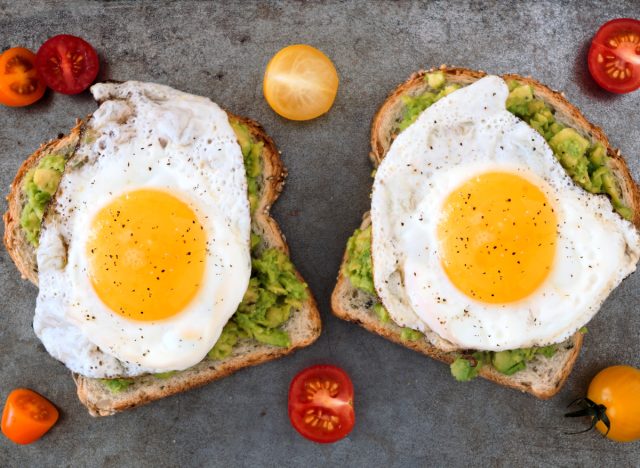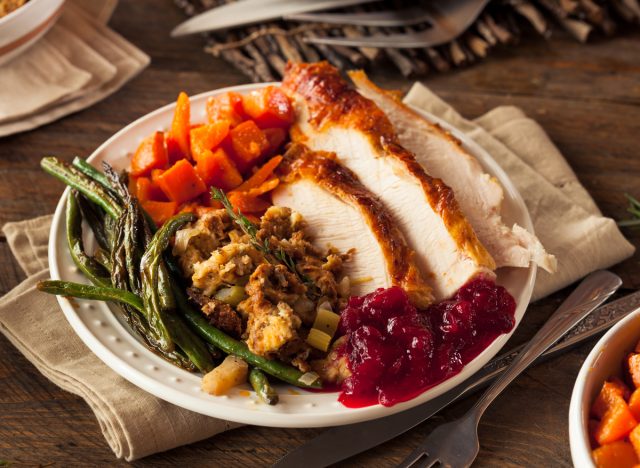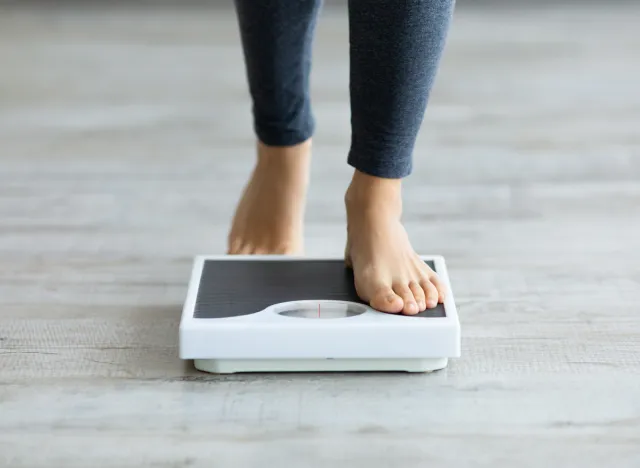The eating season officially begins this week with Thanksgiving. From Turkey Day to New Year's Day, many of us overindulge, skip workouts, and drink more alcohol compared to other times of the year. According to the Calorie Control Council, the average Turkey Day feast packs in more than 3,000 calories and 150 grams of fat in a Thanksgiving meal. That's the calorie equivalent of more than eight glazed chocolate doughnuts.
The end result is a holiday gift that's hard to return—weight gain.
If you want to enjoy your Thanksgiving holiday and stay on track, here are six habits to avoid. Read on, and for more on how to eat healthy, don't miss 7 Healthiest Foods to Eat Right Now.

It may seem counter-intuitive, but if you skip out on your first meal on Thanksgiving Day, it can ultimately lead you to eat more calories during the entire day. A breakfast with filling whole grains and protein can help tamp down hunger and cravings all day long. What's more, it can help keep you motivated to stick with your game plan for how you're going to approach your holiday meal. Skipping meals causes blood sugar levels to slump and helps trigger cravings and overeating.
RELATED: Sign up for our newsletter to get daily recipes and food news in your inbox!

The holidays are considered "…the most wonderful time of the year…" but they're also the booziest. If you're prone to celebrate with one too many alcoholic beverages, it's a surefire way to derail your healthy lifestyle goals. Not only is alcohol calorie-rich (seven calories per gram), but it also stimulates your appetite and reduces inhibitions. A half-cup of servings of spiked eggnog has more than 250 calories and five teaspoons of sugar and four ounces of wine is 100 calories. After a few drinks at your festive dinner, you won't be able to stop at one slice of pumpkin or pecan pie. Instead, avoid alcohol and choose festive low-cal mocktails instead.
READ MORE: Healthy Mocktail Ideas That Prove You Don't Need Alcohol to Have Fun

Many traditional Thanksgiving recipes call for loads of butter, sugar, and salt. By simply making a few substitutions, you can shave hundreds of calories and cups of added sugar from your holiday dishes without sacrificing flavor. Here are some of my favorite smart substitutions:
- Use fruit puree like unsweetened applesauce, banana, or prune puree for half of the oil in baked goods like brownies, quick bread, or carrot cake.
- Use nonfat plain Greek yogurt in place of sour cream.
- Use a stevia-based baking sweetener in place of table sugar in your cranberry sauce and baked goods.
- Use skim or 1% milk instead of whole milk in your mashed potatoes.
- Use extra virgin olive oil in place of butter.
RELATED: 10 Healthy Twists on Classic Thanksgiving Recipes, According to Dietitians

The good news is that many traditional Thanksgiving dishes, like turkey, cranberry sauce, sweet potatoes, and other veggie side dishes are pretty healthy choices and you can have a balanced meal at Thanksgiving. When I'm about to eat a holiday dinner, I'll assess what's available and fill my plate with the healthiest foods first. If I'm not satisfied after eating the best choices only then will I go back for some of the more decadent treats. This strategy helps you fill up on more nutritious foods and can help you reduce overall calories at your holiday meal.

Houseguests, last-minute food shopping, and crack-of-dawn baking can rob you of precious shut-eye leading up to the big feast. Studies show that lack of sleep ups your hunger hormones and cravings and leads to overeating. To stick to your optimal sleep schedule, get organized several days in advance, delegate tasks, and learn to say no to ensure you get your optimal hours of sleep. You're not being a killjoy by skipping out or turning in early if you feel worn down; you're being smart.

One of the best ways to stay on track during Thanksgiving has nothing to do with food. Instead, it's stepping on the scale on Thanksgiving morning. Studies show that those who have daily weigh-ins are less likely to gain weight than those who don't weigh themselves. In fact, a review article published in the journal Obesity evaluated some 17 studies about weigh-ins. The researchers concluded that frequent self-weighing is one of the best strategies to lose weight, prevent weight gain and maintain a healthy weight. People who weigh themselves frequently lose more weight, keep it off, and are less likely to regain weight compared to those who don't weigh in frequently. What's more, other studies show that during the holiday period, many people stop weighing themselves as frequently.
Read this next:
Worst Eating Habits During Thanksgiving To Avoid, Says Dietitian — Eat This Not That - Eat This, Not That
Read More

No comments:
Post a Comment